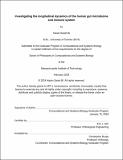Investigating the longitudinal dynamics of the human gut microbiome and immune system
Author(s)
Bi, Haixin Sarah
DownloadThesis PDF (14.90Mb)
Advisor
Alm, Eric J.
Terms of use
Metadata
Show full item recordAbstract
This thesis reports three explorations of two human-associated biological systems: the gut microbiome and the adaptive immune system. These two systems are closely intertwined, and engage in significant crosstalk with each other and with the rest of the body. Advances in recent years in high-throughput sequencing technologies have enabled study of these systems with unprecedented depth and comprehensiveness. In this thesis I leverage these tools to uncover novel insights into their composition and function. In the first chapter, I describe a project in which we closely tracked a small cohort of subjects’ microbiomes over a period of up to one year, as they traveled from North America to Africa and back. We then intersected these data with data from African locals and contextualized our results via reanalysis of larger, published datasets on travelers’ microbiomes, to build a fuller picture of what happens to our gut microbes when we travel. In the second chapter, I describe an analysis of a forthcoming microbiome data resource from our lab, in which I examined and quantified the diversity of antiphage defense capabilities at the strain level within the gut microbiome. My results underscore the value of large, cross-sectional datasets to capture underlying strain heterogeneity. Finally, in the third chapter, I describe a longitudinal study of an important component of adaptive immunity, the T cell receptor (TCR) repertoire, in healthy individuals over a time span of up to one year. Our results served as the first reference point for normal temporal fluctuations in TCR repertoire dynamics. Together, this thesis underscores the value of modern sequencing-based observational study of these complex human systems, using both cross-sectional and longitudinal designs.
Date issued
2024-02Department
Massachusetts Institute of Technology. Computational and Systems Biology ProgramPublisher
Massachusetts Institute of Technology